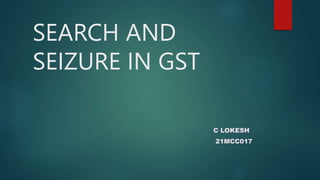
gst ppt.pptx
- 1. SEARCH AND SEIZURE IN GST C LOKESH 21MCC017
- 2. SEARCH: search is a procedure carried out by the tax authorities to investigate suspected cases of non-compliance or evasion of GST laws. The search can be conducted by authorized officers under Section 67 of the Central Goods and Services Tax (CGST) Act, 2017 The purpose of the search is to gather evidence related to any non- compliance or evasion of GST laws. During the search, the officers can examine any premises, including business premises, residences, and other places where they suspect that there may be evidence of non-compliance
- 3. . They can also seize any goods or documents that they believe may be useful for under GST law The officers may also examine electronic devices, such as computers, laptops, and mobile phones, to obtain evidence related to tax evasion It is important to note that the taxpayers have the right to be present during the search, and they can also be accompanied by a witness or a legal representative. They have the right to ask for a copy of the search warrant and any documents seized during the search.
- 4. SEIZURE : seizure refers to the power of the tax authorities to take possession of any goods or documents that they believe are related to non-compliance or evasion of GST laws. The seizure can be conducted by authorized officers under Section 67 of the Central Goods and Services Tax (CGST) Act, 2017. During the search, if the officers come across any goods or documents that they believe are related to non-compliance or evasion of GST laws, they can seize them. The seizure can be of goods such as raw materials, finished products, or any other items that are suspected of being used for evasion of GST. The officers can also seize any documents, such as bills, invoices, books of accounts
- 5. It is important to note that the officers must follow the due process while conducting the seizure, and they must provide a seizure memo to the taxpayer. The seizure memo should contain details of the goods or documents seized, the reasons for the seizure, and the place where they are being taken.